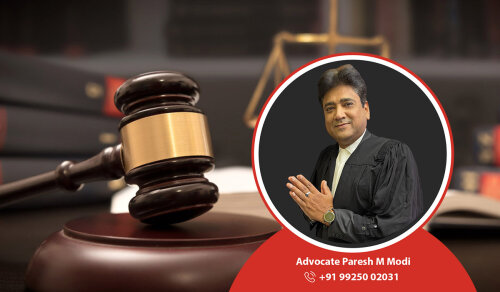Best Arrests & Searches Lawyers in Ahmedabad
Share your needs with us, get contacted by law firms.
Free. Takes 2 min.
List of the best lawyers in Ahmedabad, India
About Arrests & Searches Law in Ahmedabad, India
The laws governing arrests and searches in Ahmedabad, like the rest of India, are outlined primarily under the Code of Criminal Procedure, 1973 (CrPC) and the Indian Constitution. These laws protect the rights of the accused and safeguard them from any misuse of power by the police. For instance, any arrest, according to Section 41 of CrPC, requires some level of reasonable complaint or credible information, and searches must follow appropriate procedures as per the law.
Why You May Need a Lawyer
Legal assistance in arrests and searches cases may be necessary during various scenarios. If you feel your rights were violated during an arrest or a search, or believe there has been an error in the legal process, it could be beneficial to consult a lawyer. Furthermore, if you are falsely accused or arrested without any evidence, a lawyer can help defend your rights and navigate the complex legal proceedings.
Local Laws Overview
As per local laws in Ahmedabad, the police are not permitted to arrest an individual without valid reasoning or warrant. Additionally, women can only be arrested by a female police officer in order to maintain their dignity and respect. During searches, the law requires officers to use the least invasive methods possible, which should ideally be conducted in the presence of the occupant of the premises. All these operations must be recorded to prevent misuse of power by the police.
Frequently Asked Questions
1. Can the police arrest without a warrant in Ahmedabad?
As per Section 41 (1) and (1A) of the CrPC, the police may arrest without a warrant only under certain circumstances, such as suspicion of a cognizable offence.
2. What information must the police provide at the time of an arrest?
The police are mandated by law to inform the arrested individual of the full particulars of the offence for which they are being arrested, as well as their rights to bail, per Section 50 and 50A of CrPC.
3. Can the police conduct a search without a warrant?
The police can conduct a house search without a warrant only in cases where they believe that a delay in obtaining a warrant would lead to the loss, destruction, or removal of evidence relating to an offence.
4. What rights do I have if I’ve been wrongfully arrested?
If you’ve been illegally arrested, you have the right to contest your arrest before a court of law. This could lead to your immediate release or action against the officers involved.
5. Do I have the right to a lawyer during interrogation?
Yes, according to Section 303 of CrPC and Article 22(1) of the Indian Constitution, every person accused of an offence has a right to consult and be defended by a legal practitioner of their choice.
Additional Resources
You can reach out to the Gujarat High Court Legal Services Committee, the Gujarat State Legal Services Authority, or the District Legal Services Authority, Ahmedabad for legal advice and aid. Various NGOs such as 'Janvikas' and 'Human Rights Law Network' in Ahmedabad also provide legal assistance.
Next Steps
If you believe you need legal assistance in matters of arrests and searches, consider reaching out to a lawyer specializing in criminal law. Collect any relevant documents, and maintain a detailed record of events. Such organized information will help your lawyer to understand the situation better and form a robust defence strategy.
Lawzana helps you find the best lawyers and law firms in Ahmedabad through a curated and pre-screened list of qualified legal professionals. Our platform offers rankings and detailed profiles of attorneys and law firms, allowing you to compare based on practice areas, including Arrests & Searches, experience, and client feedback.
Each profile includes a description of the firm's areas of practice, client reviews, team members and partners, year of establishment, spoken languages, office locations, contact information, social media presence, and any published articles or resources. Most firms on our platform speak English and are experienced in both local and international legal matters.
Get a quote from top-rated law firms in Ahmedabad, India — quickly, securely, and without unnecessary hassle.
Disclaimer:
The information provided on this page is for general informational purposes only and does not constitute legal advice. While we strive to ensure the accuracy and relevance of the content, legal information may change over time, and interpretations of the law can vary. You should always consult with a qualified legal professional for advice specific to your situation.
We disclaim all liability for actions taken or not taken based on the content of this page. If you believe any information is incorrect or outdated, please contact us, and we will review and update it where appropriate.
















